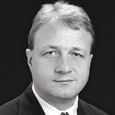CRN Interview: Joe Burke and Jim Markisohn, Arrow
Editor's note: Joe Burke, vice president and general manager of midrange business at Arrow Electronics, and Jim Markisohn, vice president of business development AT Arrow North American Computer Products, recently spoke with editors about issues in the channel.
CRN: Our first question is what's going on with Hewlett-Packard? Has the integration caused solution providers to look at other platforms to sell?

\
Burke says Arrow has invested a lot in HP's fee-for-service model.
Burke: HP for the past 18 to 24 months saw a huge influx of competitive vendors into their reseller account base. If you look at their top 50 partners two years ago, 20 or 30 were exclusive, now there's virtually no more exclusive. You've seen that manifest itself to a lesser extent with IBM and Sun [Microsystems.
CRN: Are solution providers selling more platforms than they did in the past?
Burke: Many solution providers put other platforms on their line card, but they're still focused on their original vendor. Large systems vendors, such as Dimension Data [and Forsythe have more of an even mix across platforms. Over the past 18 months, there was a lesson learned. If you put all your eggs in one basket, you have them in one basket, and if something goes wrong, you need to protect your investment.

\
Markisohn says the moves Arrow makes in Linux are a bet on the future.
Markisohn: Some viewed [the diversification as protection for the reseller, but it's also a response to the marketplace. The enterprise level has become multivendor. Now companies have RS6000 [servers in their data center, HP 9000 [servers out on the floor and a Sun box running the Web site.
Burke: Some partners have built up quite an infrastructure on a second vendor. More often though, it's just there and there's no impact on pricing.
CRN: As HP finalizes its new channel, what have your conversations with HP been about?
Burke: We have been engaged with them, and we will be engaged with them over the next couple of weeks. Compaq and HP had two completely different [distribution models. [HP's partner development manager (PDM) model is completely different than [Compaq, which has a traditional distribution model. We put a lot of investment into [HP's fee-for-service model to make that work. We want them to bring that to the table. We want the Compaq element like that. It's a robust model. It has good uses in the marketplace.
CRN: Which is the better model, Compaq's or HP's?
Burke: The volumes have changed so dramatically in that [HP business, that it's not fair to compare the two. We don't recognize revenue with HP, just the fee, which makes any comparison unfair.
CRN: What would happen if HP decided to adopt a traditional distribution model again?
Burke: The work we put into making [the PDM model happen,the warehousing work, how we ship,a lot of work went into that. It was a decision HP made, we weren't jumping for joy when they did it, but we went with it and we turned it into something with a market advantage. To change it now would create a lot of costs for HP and for us, too. I believe they'll keep the PDM model going forward.
CRN: What are you doing with Linux?
Markisohn: Linux is a factor with IBM. My sense is [that the moves we make in Linux are a bet on the future. There's enough emphasis being committed by [vendors such as IBM to bet on that horse. Now if your question is do we invest now because of demand, the answer is no. We believe [Linux will hold a place of prominence at some point, but not today. The potential is there. IBM is there. They acknowledge it's a place to play.
CRN: How can Arrow create demand for Linux?
Markisohn: We don't create demand, but similar to enterprise storage, we bet on the future. The question is, do you go out to create demand for enterprise storage? The answer is no. You prepare resellers so that when adoption occurs, our resellers are prepared better than anybody else. It's the same with Linux.